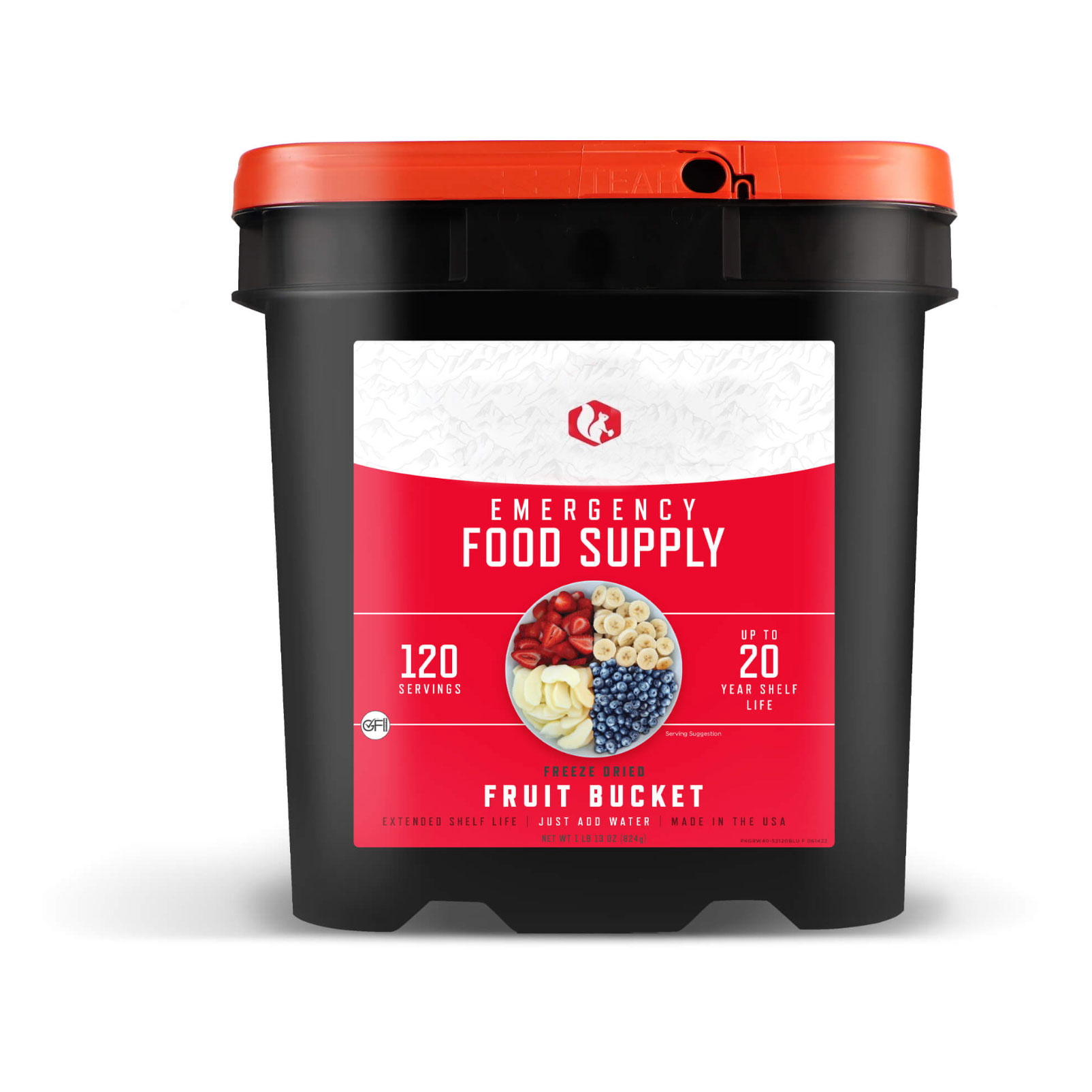I. Introduction
In the realm of emergency preparedness and long-term food storage, powdered eggs have emerged as a versatile and practical solution. These shelf-stable egg substitutes offer a multitude of benefits, making them an invaluable addition to any survival kit or pantry. Powdered eggs buckets, in particular, provide a convenient and cost-effective way to stock up on a substantial supply of powdered eggs, ensuring you have access to a nutritious and versatile food source when you need it most.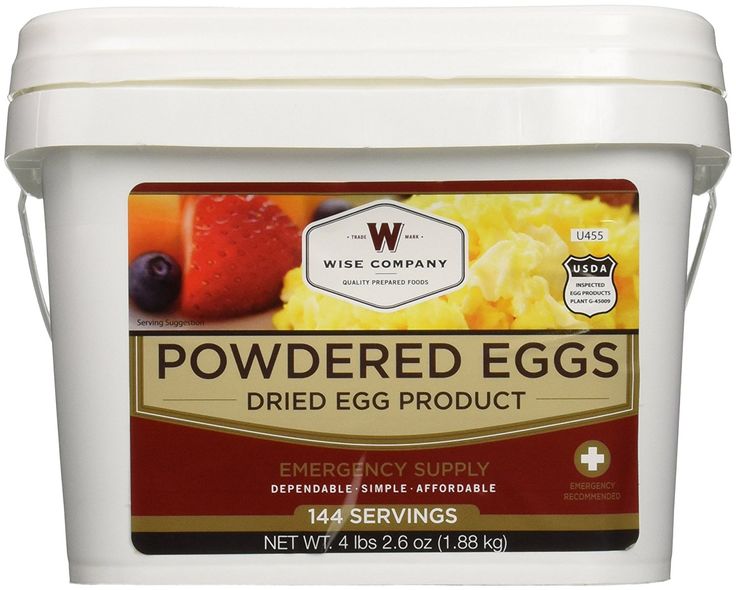
II. Benefits of Powdered Eggs
Powdered eggs, the dehydrated form of whole eggs, have gained popularity among survivalists, campers, and everyday consumers seeking a convenient and long-lasting egg substitute. These powdered eggs offer several advantages over fresh eggs, including:
-
Extended Shelf Life: Powdered eggs can last for years when stored properly, making them an ideal choice for long-term food storage.
-
Convenience: Powdered eggs are lightweight, compact, and easy to store, taking up less space than fresh eggs.
-
Versatility: Powdered eggs can be used in a variety of recipes, from scrambled eggs and omelets to baked goods and desserts.
-
Nutrient-Rich: Powdered eggs retain most of the nutrients found in fresh eggs, including protein, vitamins, and minerals.
III. Benefits of Powdered Eggs Buckets
Powdered eggs buckets provide a practical and cost-effective way to purchase and store a large quantity of powdered eggs. These buckets typically contain multiple pouches or bags of powdered eggs, offering several advantages:
-
Bulk Savings: Purchasing powdered eggs in bulk often results in lower prices per serving compared to buying individual packets.
-
Convenience: Buckets provide a centralized location for storing your powdered eggs, making it easy to access and use when needed.
-
Organized Storage: Buckets keep powdered eggs organized and protected from pests and moisture.
-
Emergency Preparedness: Powdered eggs buckets are an essential component of any emergency food supply, ensuring you have a source of protein and nutrients even in challenging situations.
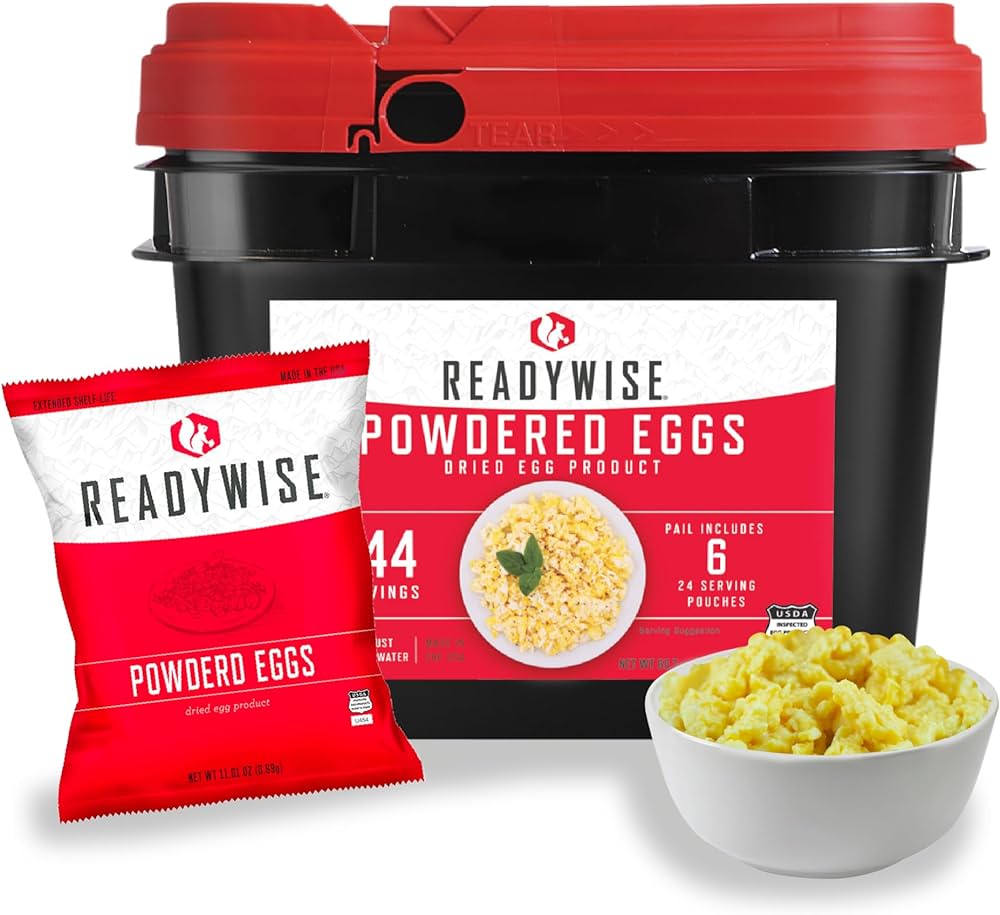
IV. Choosing the Right Powdered Eggs Bucket
With a variety of powdered eggs buckets available, selecting the right one for your needs is crucial. Here are some key factors to consider:
-
Size: Choose a bucket size that suits your storage space and consumption needs. Consider the number of people you need to feed and the frequency of use.
-
Brand Reputation: Opt for powdered eggs buckets from reputable brands known for their high-quality products and consistent customer satisfaction.
-
Customer Reviews: Read reviews from other customers to gain insights into the quality, taste, and overall experience with different powdered eggs brands.
-
Storage Requirements: Check the storage instructions to ensure you have the appropriate storage conditions to maintain the quality and shelf life of the powdered eggs.
-
Additional Features: Some buckets may include measuring cups, mixing bowls, or other accessories that can enhance your experience.
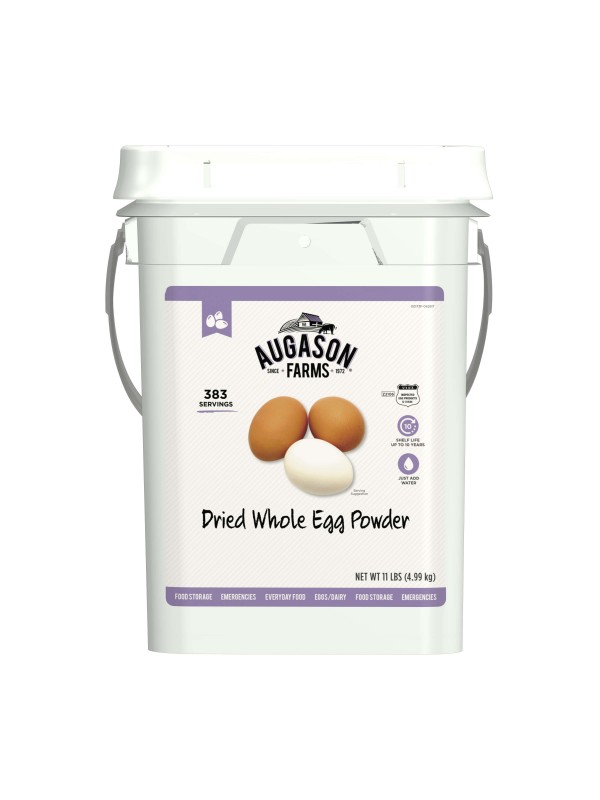
V. Popular Powdered Eggs Buckets
To help you get started, here are a few popular powdered eggs buckets that have received positive reviews:
-
-
Valley Food Storage Whole Powdered Eggs Bucket:
This bucket contains 10 pouches of whole powdered eggs, equivalent to 360 fresh eggs. It’s a great option for long-term storage and emergency preparedness.
-
-
-
Augason Farms Dried Whole Egg Powder Bucket:
This 11-pound bucket provides a substantial supply of powdered eggs, equivalent to 792 fresh eggs. It’s a cost-effective choice for bulk purchases.
-
-
-
Wise Company Powdered Eggs Bucket:
This 144-serving bucket offers a convenient and ready-to-use option for everyday use or emergency situations. The individual pouches are easy to portion and store.
-
VI. Using and Cooking with Powdered Eggs
Powdered eggs are incredibly versatile and can be used in a variety of recipes just like fresh eggs. Here are some basic tips for using and cooking with powdered eggs:
-
Reconstitution: To reconstitute powdered eggs, follow the instructions on the product packaging. Typically, you’ll mix powdered eggs with water in a specific ratio to create a liquid egg batter.
-
Cooking Methods: Powdered eggs can be scrambled, fried, baked, or used in any recipe that calls for fresh eggs.
-
Flavor and Texture: Powdered eggs may have a slightly different flavor and texture than fresh eggs, but they are still a delicious and nutritious substitute.
-
Storage After Reconstitution: Reconstituted powdered eggs should be stored in the refrigerator and used within a few days.
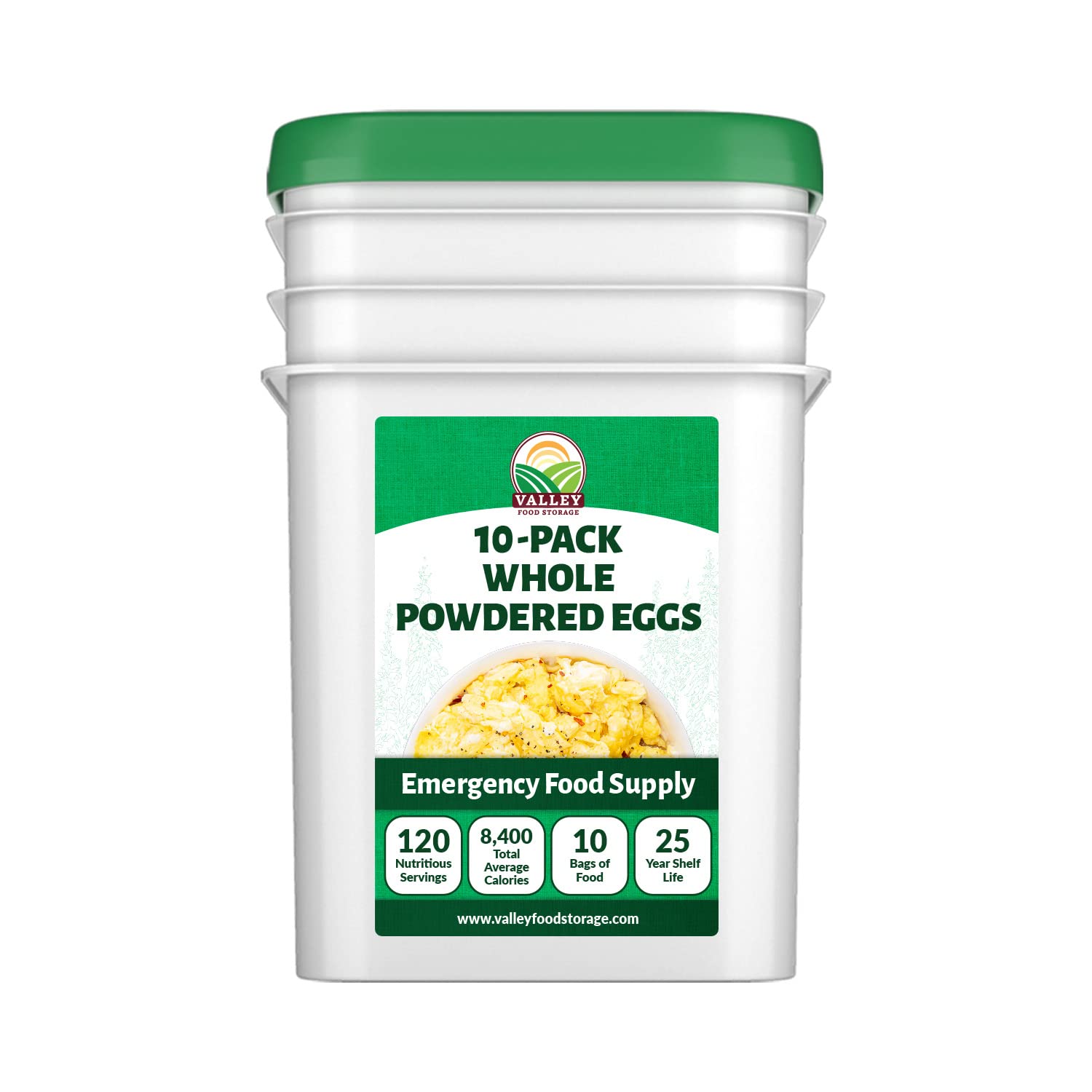
-
VII. Emergency Preparedness with Powdered Eggs
Powdered eggs are an invaluable addition to any emergency food supply. Here’s how they can be a lifesaver in unexpected situations:
-
Long Shelf Life: Unlike fresh eggs that spoil quickly, powdered eggs boast a shelf life of several years when stored unopened in a cool, dry place. This extended lifespan ensures a readily available source of protein and essential nutrients during emergencies like natural disasters or power outages.
-
Compact and Portable: Powdered eggs are lightweight and take up minimal space compared to their fresh counterparts. This makes them ideal for emergency kits, particularly for those with limited storage space.
-
Minimal Preparation: Reconstituting powdered eggs is a quick and easy process. Typically, you only need to mix them with water according to the package instructions. This minimal prep makes them perfect for situations where resources and energy might be limited.
-
Versatility: Powdered eggs offer a surprising level of culinary adaptability. They can be scrambled, fried, boiled, or used in baking recipes. This versatility allows for a variety of meal options during emergencies, helping to maintain morale and provide comfort food during challenging times.
-
Nutritional Value: Powdered eggs are a good source of protein, vitamins, and minerals, similar to fresh eggs. This protein content helps with satiety and provides essential building blocks for maintaining physical health during periods of stress or limited food choices.
VIII. Recipes and Cooking with Powdered Eggs
While powdered eggs may not perfectly replicate the taste and texture of fresh eggs, they can still be used to create delicious and satisfying meals. Here are some tips and recipe ideas to get you started:
-
Seasoning: Since powdered eggs can have a slightly bland taste, it’s important to use generous amounts of herbs, spices, and cheese when incorporating them into recipes. Consider adding chopped vegetables like onions, peppers, or mushrooms for additional flavor and texture.
-
Scrambled Eggs: This is a classic and easy way to use powdered eggs. Simply reconstitute them according to package instructions, add your desired seasonings, and cook them over medium heat in a pan with a little butter or oil.
-
Omelets: Powdered eggs work well for creating fluffy omelets. Follow the same reconstitution method and then add your favorite fillings like cheese, ham, vegetables, or salsa before folding the omelet over.
-
Baking: Powdered eggs can be used as a substitute for fresh eggs in various baking recipes like cakes, muffins, cookies, and breads. Experiment with different ratios to find the perfect consistency for your desired outcome.
-
Pancakes and Waffles: Powdered eggs can be a handy substitute for fresh eggs in pancake and waffle batter. This trick ensures you can still enjoy these breakfast favorites even when fresh eggs aren’t available.
IX. Conclusion
Powdered eggs offer a practical and versatile solution for long-term food storage and emergency preparedness. Their extended shelf life, compact size, ease of use, and nutritional value make them a valuable addition to any pantry or survival kit. With a little creativity and these helpful tips, you can transform powdered eggs into delicious and satisfying meals, ensuring you have access to essential protein and nutrients even during challenging times.
-

